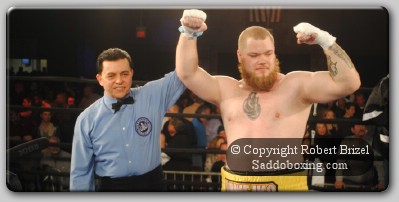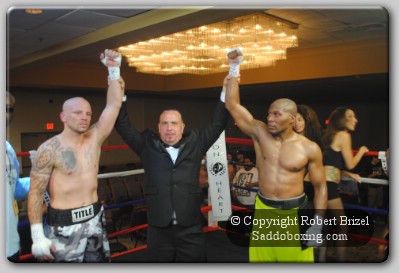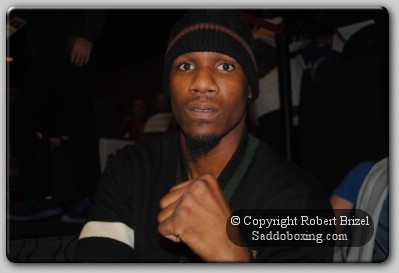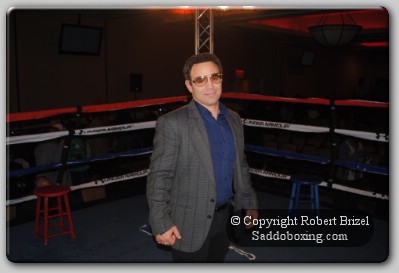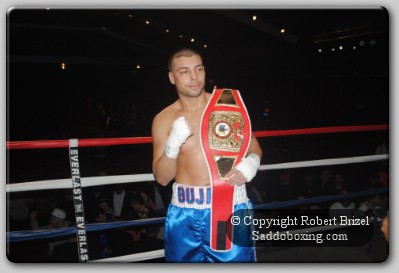Chicky said “Just do it” and I have been here ever since…”
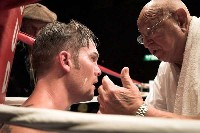 There are the rare occasions in this sport when an achievement surpasses anything that could possibly have been dreamed of. A fighter dreams of becoming a world champion and after that, being inducted into the Hall of Fame while managers dream of managing a world champion and trainers dream of training world champions.
There are the rare occasions in this sport when an achievement surpasses anything that could possibly have been dreamed of. A fighter dreams of becoming a world champion and after that, being inducted into the Hall of Fame while managers dream of managing a world champion and trainers dream of training world champions.
The world title is the peak of the mountain, so to speak, in boxing. Yet every now and again, we have those who go past that peak, they become the Mt. Everest of achievement. Fighters of the past like Ray Robinson, Ray Leonard, Muhammad Ali and Joe Louis. Promoters like Don King, Bob Arum and Tex Rickard. Trainers such as Nacho Beristain, Emmanuel Steward and Ray Arcel.
People starting out in these professions all aspire to become just like the men mentioned above, men who are true heroes of the game that so many of us looked up to as kids.
In the past, I have mentioned that as a kid I watched Muhammad Ali fights on television with my father and it was watching those fights with dad that made me a lifelong card carrying fan of the sport.
As almost everyone out there knows, be they a fan of boxing or not, Ali has not only been a favorite of millions but is also widely considered the greatest heavyweight of all time, or at least ranked second behind Joe Louis.
What is often forgotten is that there was a man who played a pivotal role in making Aliʼs career as successful as it was in the ring. The man who stood in the corner between rounds talking to the champion, giving him strategy, and at times even buying him an extra few seconds when needed. That man, of course, is the one and only Angelo Dundee.
Although known by the mainstream for his years with Ali and later on, Ray Leonard, Dundee is one of this sportʼs most accomplished trainers. His older brother, Chris Dundee, is a Hall of Fame inductee who was responsible for not only starting Angelo in the sport but also for putting Miami, Florida in the boxing scene.
Aside from the teachings of his brother, Angelo learned from all-time great trainers like Lou Stillman, Chicky Ferrara and Ray Arcel, never forgetting what he was taught and eventually putting his lessons to good use for what would turn out to be a career that he could have never dreamed possible.
Aside from Ali and Leonard, over the years Angelo has trained such world champions such as Luis Rodriguez, Ralph Dupas, Willie Pastrano, Jimmy Ellis, Sugar Ramos and Jose Napoles. He even trained George Foreman during Georgeʼs comeback in the 1990ʼs. Each and every one of these fighters are Hall of Fame inductees. Each and every one is a legend in their own right.
In my years as a boxing writer, I have come across countless champions and have conducted dozens of interviews. Some good, some not so good, but all were based on a current event in that person’s career. Today, I was able to speak with Angelo Dundee about the sport of boxing, but for the first time in any interview I have ever conducted, there was not a particular topic.
I did not interview him for any upcoming event, or was it to promote anything at all. In fact, I am happy that there was no particular topic because if there was, I might have not been able to hear about some of the great moments in the past that helped turn his career into the legendary one that it has become.
Read all about it here, exclusively at SaddoBoxing.
SaddoBoxing: I understand that you have been to Louisiana; how was your trip?
Angelo Dundee: “The trip was great. I had went up to a place called the “Ragin Cajun Boxing Gym” run by Beau Williford, itʼs a great place. It teaches young kids how to box and helps get them off the streets and out of trouble. Keeps them away from drugs and teaches them to become good adults. A great thing they have going there.”
SB: I take it you had a good time working with the kids? Any future champs in the bunch?
AD: “They are all good kids who work hard. They have one kid going to the Olympic tryouts. The important thing is that this is a place for the kids to go and do something productive with themselves. The gym had a fire and burnt down a while back and the community helped raise the funds to rebuild it. That shows what kind of impact their program has if the community is behind it.
“It is a place that is run from the heart, itʼs a non-profit and there for the right reasons. I gave out some award to the kids like best boxer, most improved…etc. They really were proud of their awards. The Mayor even gave me the key to the city. It was a great trip.”
SB: I had read that you are a big supporter of amateur boxing and feel it should be a staple for all fighters.
AD: “Kids need to learn boxing, the only way to do it is to have an amateur background. This way you know everything involved, you learn your footwork, bag work, dedicate to your roadwork. You canʼt do that with 15 or 20 amateur bouts. You need to spend some time as an amateur. Ali had something like 170 amateur fights, look at the amateur career Ray Leonard had. They became successful as pros because of the amateur background. Thatʼs where you learn how to box, not fight.”
SB: Angelo, you started in the boxing business long ago at Stillmanʼs gym when you were just a kid; could you have ever imagined at that time that you would still be involved in the sport in 2008?
AD: “No, I donʼt think so. I started back in 1948 when I was in the military, thatʼs where I met guys like Marcel Cerdan. Me and a buddy of mine, Jimmy, were in Europe where they had the USO tour and my brother Chris was running the fights. He would have me and Jimmy work corners for the bouts.
“We pretty much didnʼt know anything at the time ,we were just statues in the corner. Up until that time, the only thing we knew about boxing was to put on gloves and hit each other. Jimmy licked me all the time, (laughs) I could never take one to the body.”
SB: Is that what brought you to the sport full time? Or was it further down the road before you decided to enter the business full time?
AD: “A little while later is when I went to Stillman’s. I started out writing letters to promoters and sending out guy’s records. I would take pictures of the fighters for their profiles and it was after that I started learning the boxing part itself. I would help out in the gym and watch Lou or Chicky Ferrara and study what they did.
“I paid attention to how things were done and remembered everything I saw. Then, one night Chicky brought me to Fort Hamilton for some fights. He throws a roll of tape and gauze at me to wrap hands. I look at him and say, ‘I donʼt know how to do this!’ and Chicky just tells me to do it. So, I wrapped the hands based on what I had observed in the gym and ever since that night, I have been in the sport.”
SB: Is that when you became a full time trainer?
AD: “I kept going to Stillman’s and learning things by paying attention. I learned that with boxing, at times you had to be not only a trainer but sometimes a psychologist. I learned that stuff from Ray Arcel. I would watch him work with Willie Pep and sometimes Willie would get strung about something or another in the ring and Ray would talk with Willie while he worked on the bag and things would be alright by time he was done. Ray had that knack with all of his fighters. He was a psychologist and I learned from that.”
SB: When did you get your own fighters to train?
AD: “I would work with some fighters in the gym and take a few to the local club shows. It was about this time I met my wife, Helen, who was then my girlfriend. She lived in Jackson Heights and was a model at the time. I did not have much money, so she would have to come with me to the fights before we went out or else I would not have any money.
“I would make about 15-20 bucks and after the fight ,we would go on our date. She never minded and 56 years later, she is still with me. The club scene dried up in New York and I wasnʼt able to make a living there anymore, so it was time to head down to Florida.”
SB: How was the boxing scene down there? I would have guessed that if boxing in New York was going through a dry spell at the time that it would have been that way everywhere?
AD: “We went down there and my brother Chris would manipulate the promoters, like Ken Olermen, to get fights. He would have a guy and play him to the promoter with a bunch of different angles so they would sign bouts. Sometimes, it was harder than others. Some guys you could not get fights for, like Tommy Bell.
“So what would happen is my brother would try and get him a fight and it was not working out, so I would come in with a guy and act like he is a star. Talk about how great he was. Then we would say we were willing to fight anyone and my guy could beat anyone. Then the promoter would sign the fight between my guy and Bell. Thatʼs how my brother got fights.”
SB: You trained two Hall of Fame fighters in junior middleweight champion Ralph Dupas and light heavyweight champion Willie Pastrano. Many people donʼt know that Dupas is the one who got Pastrano started boxing, to stay in shape, and it was supposed to be nothing more than that. Did you start training them both at the same time or is it just coincidence you ended up with both fighters?
AD: “No, I started with them both at the same time. Ralph was a good boxer and Willie was a fat kid, so Ralph would have him come to the gym and get in shape. Willie would only work out at night but then as he learned things, he started coming during the day. The two of them were in high school at the time and in the summer, they would come down to New Orleans and fight.
“It was either that or California but New Orleans was closer. Thing was that they were not allowed to go more than six rounds because of their age. Ralph, at the time, was not a six round fighter, he was a main event fighter. To get past this problem, my brother Chris talked with the commission there and convinced them to let the bout go eight rounds, but they were two minute rounds. Thatʼs how we would get Ralph into 8 round bouts in Louisiana.
Ralph and Willie were both real nice kids. They called me Mr. Angelo all the time, my wife would try and tell them it was Mr. Dundee, but they kept saying Mr. Angelo. Ralphʼs family called me not too long ago and thanked me for all the years I worked with him. I guess towards then end he would talk about me. They would yell to him “Angelo” and Ralph would yell back “Dundee”. He was a real nice guy his whole life and I enjoyed the years I worked with him.”
SB: When you were not in New Orleans during that time, you were in Florida training fighters; is that where you met Sugar Ramos?
AD: “I would go over to Cuba all the time. Things were different back then, you could go in and out of Cuba without any problems. I liked Cuba, the people were really nice over there. I had Sugar Ramos, Jose Napoles and Louis Rodriguez then. There was another guy, Jose Liguero, I was going to train here in the United States, but they closed the door by that time and it was too late.”
SB: So whatʼs next for you in the sport?
AD: “I am still working with guys, right now I am working with a kid named Jermain Macky. He is a good fighter who I think will become a champion in the future. The sport of boxing is strong right now and we have some real good fighters. One guy I like is that kid from Ohio, Kelly Pavlik. He has a world title and he has not even reached his potential yet, by time he is done he could be great.
“There are a ton of young guys like that in the sport right now and I am looking forward to seeing exactly how far they all go. Plus, I am going to have a few of my own guys in the future.”
SB: Angelo, I want to thank you again for your time it has been great speaking with you about the sport and hearing your old stories on things from the past. It has been a pleasure.
AD: “Hey, thank you, I enjoyed telling you the stories. You have my number, anytime you want to speak boxing, just give me a call.”
 Boxing News Boxing News
Boxing News Boxing News
